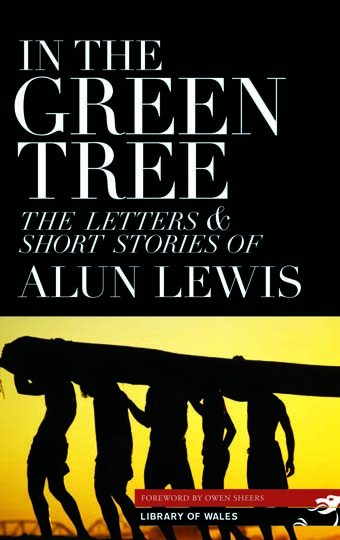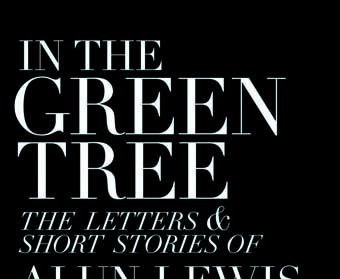Jon Gower reviews In the Green Tree, a poignant collection of the letters and short stories of Welsh writer Alun Lewis from his time in India.
There cannot be a Library of Wales volume more laden with poignancy. With that terrible hindsight that comes with knowledge of his early death, pretty much everything the Cwmaman born poet and writer Alun Lewis penned is tinged with shadow, the sure knowledge that his writerly promise will be expunged. Death hangs like a tropical musk in this green tree. It came with a close-range shot to Lewis’s head, during the Burma campaign against the Japanese, the fateful revolver by his side. What seemed like suicide was deemed to be an accident, a military tribunal deciding the man had tripped. We shall never know the truth but reading the missives and tales is an act akin to reading Sylvia Plath’s fatidic poems, the lines seemingly seeping gas, or the late and final poems of mid Walian T Harri Jones, who hints at death by drowning, just before he drowns in the sea off New South Wales.
Alun Lewis was a poet and short story writer who proved the validity of his vision and the deftness of his story telling early on, although, in truth he only had four years’ worth of public recognition, itself resulting from four volumes, or a total of ninety-five poems and twenty-five stories The tensions between an army life and an authorial one were a constant vexation to him. In a letter written in October 1943 he writes thus:
Usually I don’t know anything about a poem or a story until suddenly I discover that it’s written itself, and I’m left with an incredulous and pleasantly surprised tiredness. I feel more and more that my metier is writing: that that’s the only real thing I can do. I can be a moderately good soldier, but not very good, because I have too many scruples and a certain detachment from it all that tends to undermine my physical energy and enthusiasm.

The Letters & Short Stories of Alun Lewis
Yet war, and his postings overseas, gifted him much of his best material, in a land where ‘the rains make the burning cruel earth into a green gentleness of fruit and leaf.’ A football accident which broke Lewis’ jaw – coupled with a subsequent bout of dysentery – put him in hospital in India, from which period flowed one of his strongest tales, namely ‘Ward ‘O’ 3 (b)’ with its finely drawn cast of characters, all waiting for the medical board which might be their ticket home. The story about an Army excursion marred by murder, ‘The Orange Grove’ turns into a ghastly, nightmarish quest, as a lorry driver tries to get the body of the victim home, or at least into the hands of officialdom. It ends almost mystically, with the driver seeking help from some gypsies who take him with them, though he has no earthly idea where they are taking him.
And then there is the acknowledged masterpiece, ‘The Raid,’ which is taut with a real, palpable tension as a man called Selden is dispatched by Military Intelligence to capture a man suspected of a cinema bombing which killed three British soldiers. The very land seems to hate the platoon as they journey on under cover of night, over mountains, with mosquitoes in irritating attendance, and jackals yowling.
In The Green Tree curiously works well as a travelogue and this because of its vibrant, vivid and poetically attentive descriptions of Asia. Here’s an Indian afternoon, when ‘the sun uncurls his sting as a scorpion its tail,’ rendered in ‘The Reunion’ which stemmed from a two day leave with Alun’s brother Glyn in Poona in 1943:
The sweeper drives the fag-ends before him slowly with twig brush, bending dustily. The chowkeydar contemplates the shade with green eyes, the room boys lie on the inner pavement, smoking brown leaf, spitting red betel juice, eyes indolent with submerging consciousness. The violence of the sun makes inertia ominous.
It is difficult to read this book without those nagging questions about what might have been. We have to comfort ourselves with what we have, writing which is ominous with talent written in a place of danger. And much of that danger lay within, for Lewis was a sensitive soul trapped within a literally regimented life. One of his instructors in Karachi accused him of being one of the most selfish men he had ever met…’You think the war exists for you to write books about it.’ In a subsequent letter Lewis counters this suggestion by saying that he didn’t deny it at the time. ‘I hadn’t the strength to explain what is instinctive and categorical in me, the need to experience. The writing is only proof of the sincerity of the experience, that’s all.’
‘The sincerity of experience’ might easily be watchwords for the epistles and tales in In The Green Tree. Slim, troubling and yet quite satisfying, it underlines what literature is lost when a soldier seemingly stumbled and a single, resounding shot rang out, piercing and final.
Jon Gower is an author and regular contributor to Wales Arts Review.











